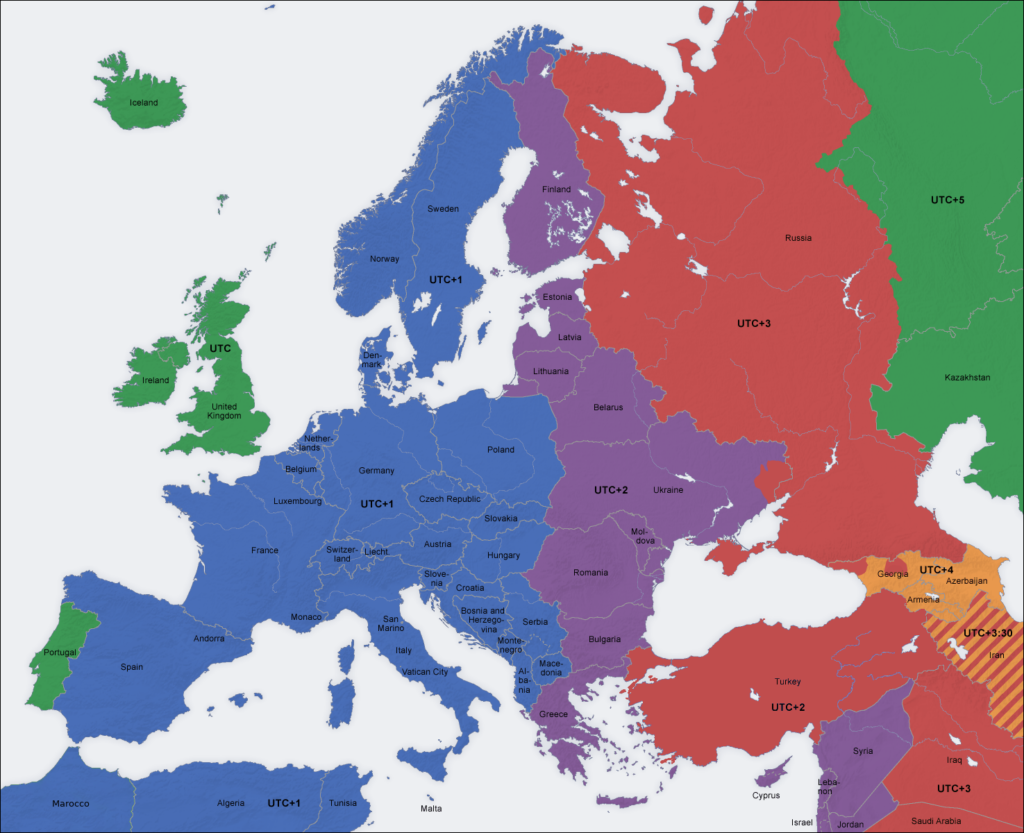In accordance with well-liked perception, time prices cash. A verified method to get extra of it’s by means of journey. By crossing an imaginary line we will acquire just a few extra hours of daylight, or typically even an entire day, relying on how far we will afford to go.
Admittedly, most European clocks haven’t been aligned with pure time since World Warfare II, when nations like Spain adopted Central European Time (CET) to align themselves with their ally, Nazi Germany. There’s little level within the West of the Mediterranean selecting a time that higher fits Poland. Many advocate splitting Europe into 4 time zones, primarily based on pure time; to make sure that the solar is at its highest round midday, however the established order appears very troublesome to alter.
It makes little sense for Poland and Spain to share the identical time zone. A map of European occasions from Wikimedia Commons.
One other main level of competition is daylight saving time coverage. They had been first launched to save lots of coal through the First World Warfare, however not serve their meant goal. These days they’re very unpopular: iAfter a 2018 survey, 84% of contributors wished to abolish the change between daylight saving time and customary time. However most of us are nonetheless caught with it, like the EU has left it as much as particular person nations to resolve whether or not to stick to winter or summer season.
Time zones and daylight saving time aren’t solely concerning the time we set our clocks, but in addition about our well being. People are often attuned to a circadian rhythm, an inner clock that is kind of attuned to daylight and darkish intervals. When this chronological mechanism is rearranged, our organic melody is not in sync with our social clocks – that’s, the schedule by which our societies function.
It’s a continent-wide, history-laden, politically charged, chronobiological puzzle. At this time’s visitors attempt to type the items:
Prof. Dietrich Henckel is a board member of the German Affiliation for Time Coverage (DGfZP) and makes a speciality of city and regional economics. His analysis considerations city temporal constructions, temporal insurance policies and the affect of sunshine air pollution on cities. Prof. Henckel is acknowledged for his contributions to the understanding of how time and temporal dynamics affect city environments and policymaking.
Dr. Imre Márton Reményi is a Budapest-born and Vienna-raised knowledgeable, with a various background starting from mechanical engineering to opera singing. He at the moment works as a coach, psychotherapist and organizational advisor, and is chairman of the Austrian Burn-Out Society. He’s additionally the CEO of Systemisches Institut Wien.
James Irons is a comic {and professional} actor from Nice Britain and Vienna who has performed and appeared in a number of roles, together with on the Open Home Theater in Vienna. He began his profession with the podcast theater group in the UK and moved to Austria two years later. He was assistant director for the play The invisible hand of the Vienna Theater Mission.
We meet them within the Alte Schmiede Kunstverein, Vienna
Artistic crew
Réka Kinga Papp, editor-in-chief
Merve Akyel, artwork director
Szilvia Pinter, producer
Zsófia Gabriella Papp, government producer
Margarita Lechner, writer-editor
Salma Shaka, writer-editor
Priyanka Hutschenreiter, challenge assistant
Administration
Hermann Riessner, director
Mission supervisor Judit Csikós
Mrs. Csilla Kardos, workplace administration
OKTO crew
Senad Hergić producer
Video recording by Leah Hochedlinger
Marlena Stolze video recording
Clemens Schmiedbauer video recording
Sound recording by Richard Brusek
Video crew Budapest
Nóra Ruszkai, sound engineering
Gergely Áron Pápai, pictures
László Halász, pictures
Publish-production
Nóra Ruszkai, chief video editor
Dialogue editor Kateryna Kuzmenko
Artwork
Victor Maria Lima, animation
Cornelia Frischauf, theme music
Captions and subtitles
Julia Sobota, Daniela Univazo, Mars Zaslavsky, Marta Ferdebar, Olena Yermakova, Farah Ayyash
Organized by the Alte Schmiede Kunstverein, Vienna
Sources
Daylight Financial savings Time and Synthetic Time Zones – A Battle Between Organic and Social Occasions by Until Roenneberg, Eva C. Winnebeck and Eva C. Winnebeck, Frontiers in Physiology.
When will the EU finish seasonal clock adjustments? Time will inform. by Alice Tidey, Euronews.
Do faculties kill creativity? Sir Ken Robinson, TED
Revelation
This speak present is a manufacturing of Show Europe: a pioneering media platform anchored in public values.
This program is co-financed by the European Union’s Artistic Europe Program and the European Cultural Basis.
Importantly, the views and opinions expressed listed below are solely these of the authors and audio system and don’t essentially replicate these of the European Union or the European Government Company for Schooling and Tradition (EACEA). Neither the European Union nor the EACEA might be held chargeable for this.

